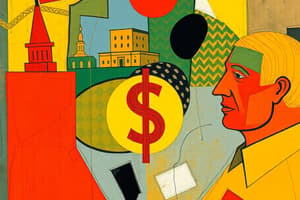Podcast
Questions and Answers
¿Qué sistema económico se caracteriza por la propiedad y control de los medios de producción por parte de individuos o corporaciones privadas?
¿Qué sistema económico se caracteriza por la propiedad y control de los medios de producción por parte de individuos o corporaciones privadas?
- Comunismo
- Capitalismo (correct)
- Mercantilismo
- Socialismo
¿Cuál es una característica clave del capitalismo que implica la determinación de los precios de bienes y servicios mediante la oferta y la demanda?
¿Cuál es una característica clave del capitalismo que implica la determinación de los precios de bienes y servicios mediante la oferta y la demanda?
- Mecanismo de mercado (correct)
- Planificación centralizada
- Precio fijo
- Control estatal
¿Qué sistema económico se asocia típicamente con el crecimiento económico, la eficiencia y la innovación?
¿Qué sistema económico se asocia típicamente con el crecimiento económico, la eficiencia y la innovación?
- Feudalismo
- Comunismo
- Socialismo
- Capitalismo (correct)
¿Cuál es uno de los posibles aspectos negativos asociados con el capitalismo en términos de distribución de ingresos?
¿Cuál es uno de los posibles aspectos negativos asociados con el capitalismo en términos de distribución de ingresos?
¿Cuál sistema económico se destaca por la planificación centralizada y la propiedad colectiva de los medios de producción?
¿Cuál sistema económico se destaca por la planificación centralizada y la propiedad colectiva de los medios de producción?
¿Qué sistema económico busca eliminar la propiedad privada de los medios de producción y establecer una igualdad económica?
¿Qué sistema económico busca eliminar la propiedad privada de los medios de producción y establecer una igualdad económica?
¿Cuál es la principal diferencia entre el socialismo y el capitalismo?
¿Cuál es la principal diferencia entre el socialismo y el capitalismo?
¿Cuál es uno de los principales desafíos del comunismo?
¿Cuál es uno de los principales desafíos del comunismo?
¿Cuál de los siguientes enunciados es cierto sobre el capitalismo?
¿Cuál de los siguientes enunciados es cierto sobre el capitalismo?
¿Cuál es el objetivo principal del socialismo?
¿Cuál es el objetivo principal del socialismo?
¿Cuál de las siguientes afirmaciones describe correctamente al comunismo?
¿Cuál de las siguientes afirmaciones describe correctamente al comunismo?
¿Cuál de los siguientes aspectos es una debilidad compartida por el socialismo y el comunismo?
¿Cuál de los siguientes aspectos es una debilidad compartida por el socialismo y el comunismo?
Flashcards are hidden until you start studying
Study Notes
Economic Systems
Economic systems refer to the frameworks through which societies allocate resources, distribute goods, and services among its members. There are different types of economic systems, including capitalism, socialism, and communism. Each system has its own strengths and weaknesses, and the choice between them often depends on factors such as cultural values, historical contexts, and the prevailing political ideologies of the time. Let's explore these economic systems in greater detail.
Capitalism
Capitalism is an economic system where the production and distribution of goods and services are primarily driven by the profit motive and the market mechanism. In capitalism, the means of production are owned and controlled by private individuals or corporations, who seek to make a profit by selling goods and services to consumers.
One of the key features of capitalism is the presence of a market mechanism, where the prices of goods and services are determined by the forces of supply and demand. This leads to what is known as a "price system," where the prices of goods and services reflect their relative scarcities and the willingness of consumers to pay for them.
Capitalism has been associated with economic growth, efficiency, and innovation. However, it also has its criticisms, such as the potential for economic inequality, environmental degradation, and a lack of social cohesion.
Socialism
Socialism is an economic system where the means of production are owned and controlled by the state or the collective ownership of the community. The goal of socialism is to achieve a more equitable distribution of wealth and resources, as well as to provide a social safety net for its citizens.
In socialism, the state plays a more active role in regulating the economy, setting prices, and ensuring that resources are allocated to meet the needs of the population. Socialism seeks to eliminate the economic inequalities that can arise in capitalism, but it also faces challenges in terms of efficiency and innovation, as the state's control over economic decisions can lead to slower decision-making and less responsiveness to changing market conditions.
Communism
Communism is a political and economic ideology that seeks to establish a classless society where all property is owned collectively, and the means of production are owned and controlled by the community as a whole. In communism, the state plays a central role in organizing economic activity and ensuring that resources are distributed according to need.
Communism aims to eliminate economic classes and inequalities, but it also faces challenges in terms of efficiency and innovation, as the central planning required for decision-making can lead to inefficiencies and inflexibilities in responding to changing market conditions. Additionally, communist regimes have been associated with human rights abuses and limited individual freedoms.
In conclusion, each economic system has its own strengths and weaknesses, and their choice often depends on cultural values, historical contexts, and political ideologies. While capitalism tends to prioritize efficiency and profitability, socialism focuses more on equitable distribution and collective ownership, while communism aims to eliminate classes and ensure equality in all aspects. Understanding these systems is crucial for making informed decisions about how societies allocate resources, distribute goods, and services among their members.
Studying That Suits You
Use AI to generate personalized quizzes and flashcards to suit your learning preferences.




